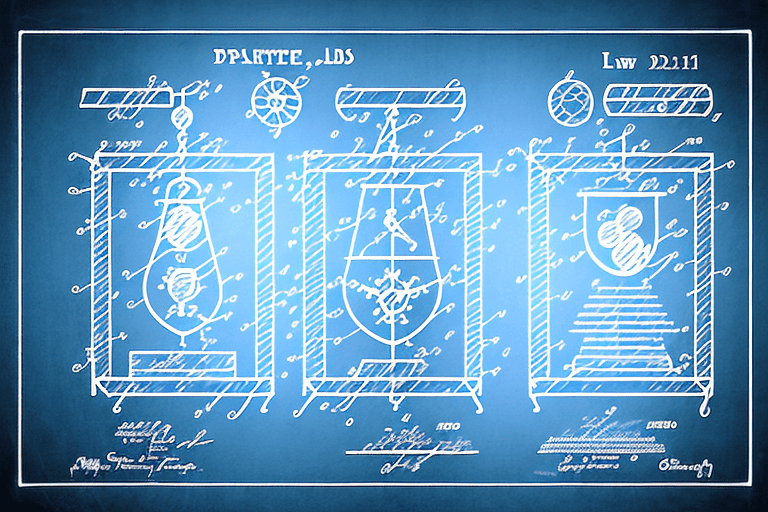Intellectual property plays a crucial role in today’s knowledge-driven economy. It ensures that individuals and organizations are protected when it comes to their inventions, designs, and creative works. In the field of intellectual property, two important roles are that of a patent agent and a patent attorney. While both professionals work in the same domain, there are notable differences in their roles, qualifications, and responsibilities.
Understanding Intellectual Property Rights
Definition of Intellectual Property
Before diving into the specifics of patent agents and patent attorneys, it is important to have a clear understanding of intellectual property. Intellectual property refers to the legal rights that individuals or organizations hold over their creations or inventions. It encompasses various areas such as patents, trademarks, copyrights, and trade secrets.
When we talk about intellectual property, we are referring to the intangible assets that are the result of human creativity and innovation. These assets can take many forms, including inventions, designs, logos, music, literature, software, and even business methods. Intellectual property rights provide legal protection to these assets, ensuring that the creators have the exclusive right to use, sell, or license their creations.
Patents are one form of intellectual property rights that protect inventions. They grant inventors the exclusive right to make, use, and sell their inventions for a limited period of time. Trademarks, on the other hand, protect brands and logos, ensuring that consumers can easily identify and distinguish products or services in the market. Copyrights safeguard original works of authorship, such as books, music, and artwork, giving creators the right to control the reproduction and distribution of their works. Lastly, trade secrets protect valuable information that gives a business a competitive advantage, such as formulas, recipes, and manufacturing processes.
Importance of Intellectual Property Rights
The importance of intellectual property rights cannot be overstated. These rights not only protect the innovators’ creations but also incentivize further innovation. By granting exclusive rights to the creators, intellectual property rights encourage them to invest their time, effort, and resources into developing new ideas and inventions.
Intellectual property rights play a crucial role in fostering economic growth and development. They provide a framework for innovation by ensuring that creators can reap the rewards of their efforts. When inventors and creators know that their ideas will be protected, they are more likely to take risks and push the boundaries of what is possible. This leads to the development of new technologies, products, and services that drive economic progress.
Moreover, intellectual property rights promote competition and consumer welfare. By granting exclusive rights to creators, these rights prevent others from copying or imitating their creations without permission. This encourages businesses to differentiate themselves and develop unique offerings, leading to a more diverse and competitive marketplace. Consumers also benefit from intellectual property rights as they can trust that the products or services they purchase are genuine and of high quality.
Furthermore, intellectual property rights foster collaboration and knowledge-sharing. Through licensing and cross-licensing agreements, creators can share their innovations with others, allowing for the exchange of ideas and the development of new technologies. This collaboration fuels further innovation and drives progress in various fields, from medicine to technology.
In conclusion, intellectual property rights are essential for protecting and promoting innovation. They provide creators with the incentive and confidence to invest in new ideas, leading to economic growth, competition, and collaboration. As we delve into the world of patent agents and patent attorneys, it is crucial to understand the significance of intellectual property rights and their role in fostering a thriving and innovative society.
Who is a Patent Agent?
A patent agent is an individual who is qualified to assist inventors and organizations in preparing and filing patent applications. Their primary role is to help clients protect their intellectual property by navigating the complex patenting process. Patent agents work closely with inventors to understand the technical aspects of their inventions and then draft patent applications accordingly.
Patent agents play a crucial role in the innovation ecosystem. They are experts in patent law and have a deep understanding of scientific and technical concepts. By leveraging their knowledge and skills, patent agents ensure that inventors’ ideas are properly protected and their inventions are granted the exclusive rights they deserve.
One of the key responsibilities of a patent agent is to conduct thorough research to ensure that the inventions meet the patentability criteria set by the relevant intellectual property offices. This involves analyzing prior art, which refers to existing inventions and technologies that may be similar to the invention being patented. By conducting a comprehensive search, patent agents can determine the novelty and inventiveness of the invention, which are crucial factors in obtaining a patent.
In addition to preparing patent applications, patent agents also assist in patent prosecution. This involves communicating with patent examiners and addressing any objections or rejections that may arise during the examination process. Patent examiners carefully review patent applications to ensure that the inventions meet the legal requirements for patentability. Patent agents work closely with examiners to provide clarifications, make amendments, and argue for the patentability of the invention.
Qualifications and Skills of a Patent Agent
To become a patent agent, individuals need to possess a scientific or technical background. They must have a deep understanding of the subject matter they will be working with, as their role revolves around evaluating the novelty and inventiveness of inventions.
In most jurisdictions, becoming a patent agent requires passing a specific set of examinations and obtaining a license. The examinations typically test the candidates’ knowledge of patent law and their ability to draft and prosecute patent applications. These exams are designed to ensure that patent agents have the necessary expertise to provide high-quality services to their clients.
Furthermore, effective communication and analytical skills are essential for patent agents. They need to be able to understand complex technical concepts and translate them into clear and concise language for patent applications. Strong research skills are also crucial, as patent agents need to conduct comprehensive searches to identify prior art and evaluate the patentability of inventions.
In conclusion, patent agents play a vital role in the patenting process. They assist inventors and organizations in protecting their intellectual property by preparing and filing patent applications. With their scientific and legal expertise, patent agents ensure that inventions meet the patentability criteria and navigate the examination process effectively. By working closely with inventors, patent agents contribute to the advancement of innovation and the growth of intellectual property rights.
Who is a Patent Attorney?
A patent attorney is a legal professional who specializes in intellectual property law. They are highly skilled and knowledgeable in the field of patents and provide valuable services to individuals and organizations seeking patent protection for their inventions.
While a patent agent is qualified to assist in obtaining patents, a patent attorney goes beyond that role. They not only help clients navigate the complex process of patent application but also provide legal advice on various intellectual property matters.
One of the key responsibilities of a patent attorney is to provide expert guidance on patentability. They analyze inventions to determine if they meet the criteria for patent protection and advise clients on the likelihood of obtaining a patent. This involves a deep understanding of both the technical and legal aspects of inventions.
In addition to assessing patentability, patent attorneys also play a crucial role in evaluating infringement risks. They conduct thorough patent searches to identify existing patents that may be similar to their clients’ inventions. By analyzing the scope of protection offered by these patents, patent attorneys help their clients navigate potential infringement issues.
Furthermore, patent attorneys are skilled negotiators. They assist clients in negotiating licensing agreements, ensuring that their clients’ inventions are properly protected and monetized. This involves understanding the value of the invention, assessing market trends, and advocating for their clients’ best interests.
Qualifications and Skills of a Patent Attorney
Becoming a patent attorney requires a unique combination of legal and technical expertise. To start, individuals must possess a law degree and pass the bar examination in the jurisdiction where they plan to practice. This legal qualification provides them with the necessary foundation to understand and navigate the complexities of patent law.
However, a strong technical background is also essential for a patent attorney. They need to be able to comprehend the intricacies of the inventions they work with and effectively communicate their technical aspects to patent examiners and other legal professionals. Many patent attorneys have degrees in engineering, computer science, or other relevant technical fields, which equip them with the necessary technical knowledge to handle a wide range of inventions.
In addition to legal and technical qualifications, patent attorneys must also be licensed by the relevant intellectual property office. This licensure ensures that they meet the necessary standards of competence and ethical conduct in their practice.
Patent attorneys also need to possess excellent analytical and research skills. They must be able to conduct thorough patent searches, analyze complex legal documents, and stay up-to-date with the latest developments in patent law. Strong communication and negotiation skills are also crucial, as patent attorneys often interact with inventors, patent examiners, and other legal professionals.
Overall, the role of a patent attorney is multifaceted, requiring a unique blend of legal, technical, and analytical skills. They play a vital role in helping inventors and organizations protect their valuable intellectual property and navigate the complex world of patents.
Key Differences between a Patent Agent and a Patent Attorney
Differences in Roles and Responsibilities
The primary difference between a patent agent and a patent attorney lies in their scope of practice. While both professionals assist in patent application drafting and prosecution, only a patent attorney can provide legal advice and represent clients in legal disputes. Patent attorneys have a broader range of responsibilities that extends beyond patent matters.
Differences in Qualifications and Skills
Another significant difference is the qualifications required to practice as a patent agent or a patent attorney. Patent agents typically have a scientific or technical background, whereas patent attorneys possess both legal and technical qualifications. The additional legal qualification allows patent attorneys to provide comprehensive advice and representation in intellectual property matters.
How to Choose Between a Patent Agent and a Patent Attorney
Factors to Consider
When it comes to deciding between a patent agent and a patent attorney, several factors need to be taken into account. One of the key considerations is the complexity of the invention and the potential legal issues surrounding it. If the invention involves complex legal matters or if there is a likelihood of litigation, seeking the services of a patent attorney may be more appropriate.
Additionally, individuals and organizations should consider their budget and the scope of assistance required. Patent agents typically charge lower fees compared to patent attorneys, making them a more cost-effective option for some inventors. However, if legal advice and representation are essential, a patent attorney may be the preferred choice.
Making the Right Decision for Your Needs
Ultimately, the decision between a patent agent and a patent attorney depends on individual circumstances. It is crucial to assess the specific requirements and weigh the advantages and disadvantages of each option. Consulting with professionals in the field can help in making an informed decision that best suits the needs and goals of the inventor or organization.
Regardless of whether one chooses a patent agent or a patent attorney, seeking professional assistance is vital in navigating the complex world of intellectual property. Their expertise and guidance can ensure that inventions are adequately protected and that individuals and organizations can fully benefit from their innovative creations.










